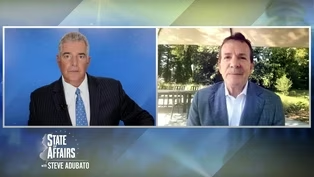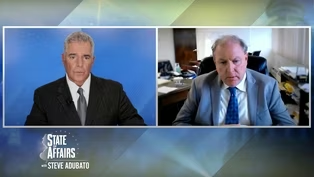State of Affairs with Steve Adubato
The Affordable Housing Crisis and the Value of Homeownership
Clip: Season 7 Episode 18 | 7m 35sVideo has Closed Captions
The Affordable Housing Crisis and the Value of Homeownership
Vivian Cox Fraser, President & CEO of Urban League of Essex County, talks with Steve Adubato about the affordable housing crisis and the ways homeownership can set up the next generation for success.
Problems playing video? | Closed Captioning Feedback
Problems playing video? | Closed Captioning Feedback
State of Affairs with Steve Adubato is a local public television program presented by NJ PBS
State of Affairs with Steve Adubato
The Affordable Housing Crisis and the Value of Homeownership
Clip: Season 7 Episode 18 | 7m 35sVideo has Closed Captions
Vivian Cox Fraser, President & CEO of Urban League of Essex County, talks with Steve Adubato about the affordable housing crisis and the ways homeownership can set up the next generation for success.
Problems playing video? | Closed Captioning Feedback
How to Watch State of Affairs with Steve Adubato
State of Affairs with Steve Adubato is available to stream on pbs.org and the free PBS App, available on iPhone, Apple TV, Android TV, Android smartphones, Amazon Fire TV, Amazon Fire Tablet, Roku, Samsung Smart TV, and Vizio.
Providing Support for PBS.org
Learn Moreabout PBS online sponsorship[INSPRATIONAL MUSIC STING] - We are pleased to be joined by Vivian Cox Fraser, President and CEO of a great organization, the Urban League of Essex County.
Vivian, good to see you again.
- Great to see you, Steve.
- As we put up the website of the Urban League, tell everyone what the organization is and the impact it has every day.
- Sure.
Well, the Urban League is a social service and community development organization.
Since our founding in 1917, our mission has been to help African Americans and other disadvantaged residents achieve social and economic advancement.
And we are, as I said, a comprehensive social service and community development organization, and we offer relevant programs and services in education, employment, housing, and economic development that empower communities and change lives.
- Let's talk about home ownership, particularly in a city of Newark.
Where are we with home ownership?
What progress have we made and what do we need to do to increase the opportunity for people to own their own home, please?
- Sure.
Well, much like many cities across the country, there is certainly a crisis in affordable housing for families, from rental options as well as home ownership options.
And certainly, with rising interest rates and issues surrounding affordability, many families find themselves locked out of home ownership.
And in Newark, the home ownership rate is, I guess over 70% of residents are renting.
And that has serious implications for the stability of communities, and importantly, of families.
So our work really is about helping people get their stake in their communities, and that's through home ownership.
- As you were talking to our producers, you talked about housing counseling services.
What exactly are we talking about?
What services are we talking about?
- So the Urban League, we have a HUD-approved housing counseling program.
- That's Housing and Urban Development.
I'm sorry for interrupting.
A federal agency, Housing and Urban Development, please.
- Yes.
And the services range from rental assistance all the way to home ownership and first-time home buyers programs, as well as also foreclosure mitigation.
So it ranges the whole home ownership or housing continuum.
So many people may come into the Urban League looking for rental assistance.
And certainly, in COVID, we had significant increase around people with the threat of eviction through the crisis.
But also all the way through home ownership.
We have programs around first-time home buyers, as well as post-purchase programs as many people who begin to purchase homes haven't had the experience of actually maintaining homes, so we have classes in that.
And then for some of the programs that we have, the houses that we're building, they're multi-family, they're two and three family homes, So we also have classes and landlord tenant laws so that people can also get the experience of being landlords.
So it ranges from the continuum.
- Vivian, put this in perspective for those of us who are blessed enough, fortunate enough to own a home.
We know that while it's challenging and a lot of, you talk about maintenance, I don't even want to go there, you know, upkeep, but how fortunate we are to own our own home, as challenging as that may be for many folks, given the high cost of living in this state, and et cetera, et cetera.
From your perspective, particularly in urban areas like Newark, what do you believe the impact is on a person on a family when they own a home?
- Well, I can speak of even my own experience.
My parents were like many of the families that we work with here in Newark, I tell everybody, my father had a third grade education, he learned to trade, he started a business, he worked like a dog, and his daughter got Ivy League education.
- That's right.
- But my mother's a nursing assistant, okay?
And so when I graduated from college, my mother graduated from college with her nursing degree, but she had been a nursing assistant.
(Steve applauding) So I really understand, you know, how to help families move and advance economically, and home ownership is key to that.
So most families, it doesn't matter your race or where you live, they have their wealth in their homes, right?
So home ownership is key to actually addressing the racial wealth gap, and also intergenerational poverty.
So being able to have home ownership really is about creating a better future for yourself, for your family, and for the next generation.
And so even the families that we serve here in Newark, when they come in, we used to serve people in our home ownership program, they were different than the people who came in for rental assistance because people that came in home ownership were already thinking that they could become homeowners.
And what we've done is really sort of shifted that model to say, you may be renting today, but we want you to understand that you can be a homeowner tomorrow.
So really, our pathway to home ownership program is really about building wealth and addressing economic disparity that we see.
So if you have your home, maybe and you've built up equity over time, if your children wanna go to college, you can tap into that equity.
If somebody's lost their job, you can tap into that equity.
If you don't have that, you don't have that financial resource to tap into.
And many families don't have like a rich uncle they can go borrow money if they needed a car repair.
So the importance of home ownership really is about building wealth for families, but also stabilizing a community.
So if you have communities that have more home ownership, those tend to be safer communities.
You don't have as many transient things going on in your communities.
And so, you know, so really when you think about it, if you- My dad used to say, "You don't see people washing a rental car," right?
(chuckling) Because- - That's right.
- When you own that car, you take care of it.
- You own it.
- And that also translates into home ownership.
- Vivian, got a minute left.
Do this for us.
You talk about home ownership, the economic challenges, and children, what they learn from that in a family by living in their own home.
But childcare.
Switch gears for a moment, we have a minute left.
We're very much involved, as you well know, in an initiative that helps create greater public awareness around accessible, affordable childcare.
There's a direct impact of the ability to purchase a home as it relates to the cost of healthcare, particularly in communities like Newark, or access to.
The importance of accessible, affordable, quality childcare, please, go ahead.
- Well, I think when you see lower income families, every expense that they have, it takes away from the amount that they have to save.
And so really, if families can't work (chuckling) and they have to stay home, we saw that in COVID, many women started taking off, left their jobs during COVID because they needed to take care of the children.
So if you don't have adequate, affordable, high-quality childcare, you can't work.
And being able to work is really an economic priority for most families.
- This is, you've been listening to Vivian Cox Fraser.
She's the President and Chief Executive Officer of the Urban League of Essex County.
Vivian, thank you so much for joining us.
We appreciate it.
- Sure, thanks, Steve.
- You got it.
Stay with us, we'll be right back.
(Sounds of Water) - (Narrator) Most people don'’t think of where there water comes from.
But we do.
Veolia, more than water.
Resourcing the world.
Clean Energy and Parental Rights in NJ Public Schools
Video has Closed Captions
Clip: S7 Ep18 | 10m 6s | Clean Energy and Parental Rights in NJ Public Schools (10m 6s)
Systemic Issues and Failures in NJ Veterans' Homes
Video has Closed Captions
Clip: S7 Ep18 | 9m 37s | Systemic Issues and Failures in NJ Veterans' Homes (9m 37s)
Providing Support for PBS.org
Learn Moreabout PBS online sponsorship
- News and Public Affairs

Top journalists deliver compelling original analysis of the hour's headlines.

- News and Public Affairs

FRONTLINE is investigative journalism that questions, explains and changes our world.












Support for PBS provided by:
State of Affairs with Steve Adubato is a local public television program presented by NJ PBS

